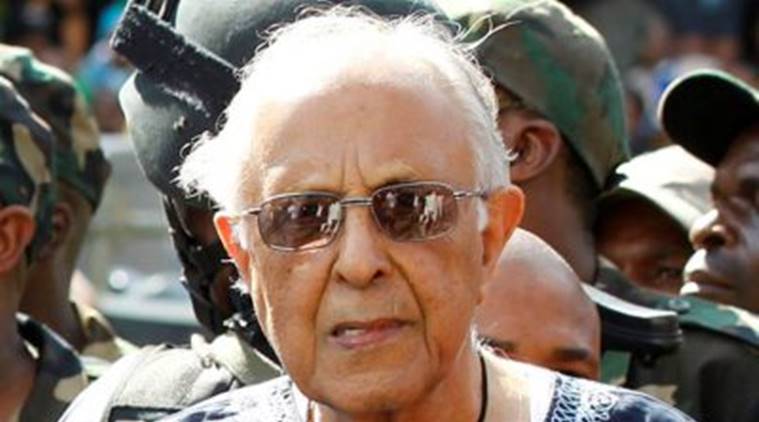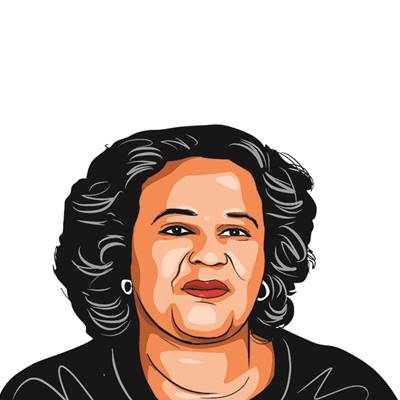Opinion A Man Of Truth
Ahmed Kathrada, ANC leader, bridged the divides in South Africa
 Ahmed Kathrada
Ahmed Kathrada  Ahmed Kathrada
Ahmed Kathrada
I wept when the Rabbi prayed at the funeral service of Ahmed Kathrada. Who else but Ahmed Kathrada or Comrade Kathy, Uncle Kathy or Mr K as he was affectionately called, could bring a Rabbi to pray at a Muslim funeral? The Rabbi’s prayer had been preceded by the Maulana, the Archbishop and the Guru. The mourners attending the funeral of one of South Africa’s greatest liberation heroes reflected the diversity of the inter-faith prayers.
In an increasingly fundamentalist and divided world, there are people who can transcend sectarian divisions and break the barriers of religion, class, race, gender, ethnicity and political divides to reach right into the essence of what makes us all human. Like the exceptional cohort of leaders of whom he was a part, Kathrada bridged divides and made us feel that we have the agency to create a better world.
Ahmed Mohamed Kathrada was born on August 21, 1929, a decade after his parents Mohamed and Hawa Kathrada, immigrants from India, had settled in the tiny town of Schweizer Reneke in the then Western Transvaal province of South Africa. At the age of eight, Kathrada was sent to stay with family in Johannesburg because there was no Indian school in the town of his birth. The traumatic parting from his parents sparked his political consciousness and, at the tender age of 12, he joined the Young Communist League of South Africa. He met and was influenced by South African Communist Party and Indian Congress leaders such as Yusuf Dadoo, Ismail Meer, Yusuf and Maulvi Cachalia and J.N. Singh. As a young Transvaal Indian Congress activist, Kathrada had the audacity to challenge the rising political star, Nelson Mandela who described him as “barely 21 and like all youths keen to flex his muscles”. The fiery confrontation developed into a lifelong friendship with Mandela and Walter Sisulu.
Throughout his life, Kathrada was never afraid to speak truth to power and he continued to do so even after his death on March 28, 2017, through a letter he had written to President Jacob Zuma, a year before he passed away. The letter is a remarkable political document in which Kathrada reminds the President of his political credentials — that he, Kathrada was among the 20 accused in the Defiance Campaign Trial of 1952, one of the 156 accused in the Treason Trial of 1956-61 and one of the eight accused in the famous Rivonia Trial, in which he was sentenced to life imprisonment in July 1964. He was released with Sisulu and others in October 1989, four months before Mandela.
He stated that as a loyal and disciplined member of the ANC and the broader Congress movement since the 1940s, he followed the principle of never criticising publicly his organisation or its leaders but the Constitutional Court ruling that the President had failed to defend and respect the constitution had forced him to break that tradition and ask the President to do the right thing and step down. Former President Kgalema Montlanthe received a standing ovation from mourners at Ahmed Kathrada’s funeral when he quoted from the letter: “And bluntly, if not arrogantly, in the face of such persistently widespread criticism, condemnation and demand, is it asking too much to express the hope that you will choose the correct way that is gaining momentum, to consider stepping down.”
It had been made clear to President Zuma that, in accordance with Kathrada’s wishes, he would not be asked to speak at the funeral. The official government memorial was “indefinitely postponed” so the Ahmed Kathrada Foundation organised its own memorial on Saturday, April 1. Thousands attended the politically charged memorial at which mourners vented their anger and frustration at President Zuma’s controversial cabinet reshuffle on March 31. Kathrada’s widow Barbara Hogan and former Finance Minister Pravin Gordhan were among the speakers who reiterated our beloved Comrade Kathy’s call for President Zuma to step down.
Even after death he has provided a moral beacon when we most need it. In the words of diplomat and author Gopalkrishna Gandhi: “What has Kathrada shown? Don’t confuse being good with being naïve, being brave with drama, being wise with a whole lot of high-sounding words. And — above all — don’t dig the past for the leaden weight of its hated memories. Do so for the gold of a new awakening.”




